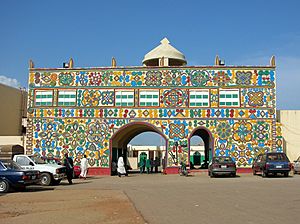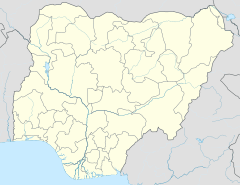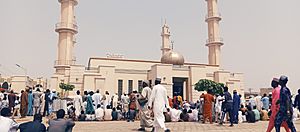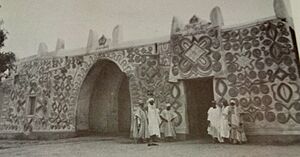Zazzau facts for kids
Quick facts for kids
Zazzau
|
||
|---|---|---|
|
Traditional state
|
||

Gate to the palace of the emir of Zazzau
|
||
|
||
| Country | ||
| State | Kaduna State | |
| Government | ||
| • Type | Monarch | |
The Zazzau, also known as the Zaria Emirate, is a traditional state in Nigeria. Its main city is Zaria, located in Kaduna State. The current leader, called the Emir of Zazzau, is Alhaji Ahmed Nuhu Bamalli. He took over from the previous emir, Alhaji Shehu Idris.
Contents
Discovering Zazzau's Rich History
The Early Hausa Kingdom of Zazzau
The main way we know about Zazzau's early history is from a special story. This story was written down in the early 1900s, but it had been passed down by people telling it for many years. It shares the exciting tale of how the Hausa people's kingdoms began. The story says that a hero named Bayajidda founded them.
This old story also lists the rulers and how long they were in charge. According to this timeline, the first Hausa kingdom of Zazzau started around the 11th century. It was founded by a king named Gunguma. Zazzau was also one of the seven original Hausa Bakwai states.
One of Zazzau's most famous early leaders was Queen Amina. She ruled either in the mid-1400s or mid-1500s. A historian from the 1800s, Muhammed Bello, believed she was the first to create a strong kingdom among the Hausa people.
Zazzau was an important trading hub. Goods, including people, were exchanged here. These were then sent to northern markets like Kano and Katsina. There, they were traded for salt with merchants who traveled across the Sahara desert.
The old stories say that the religion of Islam came to the kingdom around 1456. However, it seems to have spread slowly. Some older traditions and rituals continued until the Fulani people took over in 1808. Throughout its history, Zazzau was sometimes controlled by powerful neighbors. These included the Songhai, Bornu, and Kwararafa kingdoms.
The Fulani Emirate Takes Over
In December 1808, the kingdom of Zazzau was captured. This happened during a big religious war known as the Fulani jihad. The Hausa ruler at the time managed to escape to a place called Abuja. There, he started a new state, now known as the Suleja Emirate. He kept his independence and the title "Sarkin Zazzau." The leader of the modern Zazzau Emirate also uses this same title, "Sarkin Zazzau" or "Sarkin Zaria."
After the war, the Fulani people, who were often nomadic herders, married into the Hausa farming communities. Because of this, the people of the Emirate today are often called Hausa-Fulani. The way the Zaria Emirate was governed was a bit different from other emirates created then. Important jobs were not usually passed down from parents to children. Instead, people were chosen for these roles based on their skills or duties.
Important Rulers and Changes Over Time
Over many centuries, Zazzau had a long line of rulers. These leaders guided the kingdom through different periods of its history.
The early Hausa kingdom had its capital in various places like Turunku and Wuciciri. Around the end of the 16th century, the kingdom's name changed to Zaria. The city of Zaria itself was founded in 1536 and named after Chief Bakwa's daughter, Zaria.
In 1804, the Fulani Empire took control of the kingdom. By 1835, it officially became an emirate. The Hausa rulers who were in charge before went into exile and founded a new state in Abuja. Later, in 1902, the British took over the emirate.
Since then, Zazzau has continued to have its own rulers, even during the colonial period and after Nigeria became independent. The current Emir, Ahmed Nuhu Bamalli, continues this long tradition of leadership.
 | Mary Eliza Mahoney |
 | Susie King Taylor |
 | Ida Gray |
 | Eliza Ann Grier |





